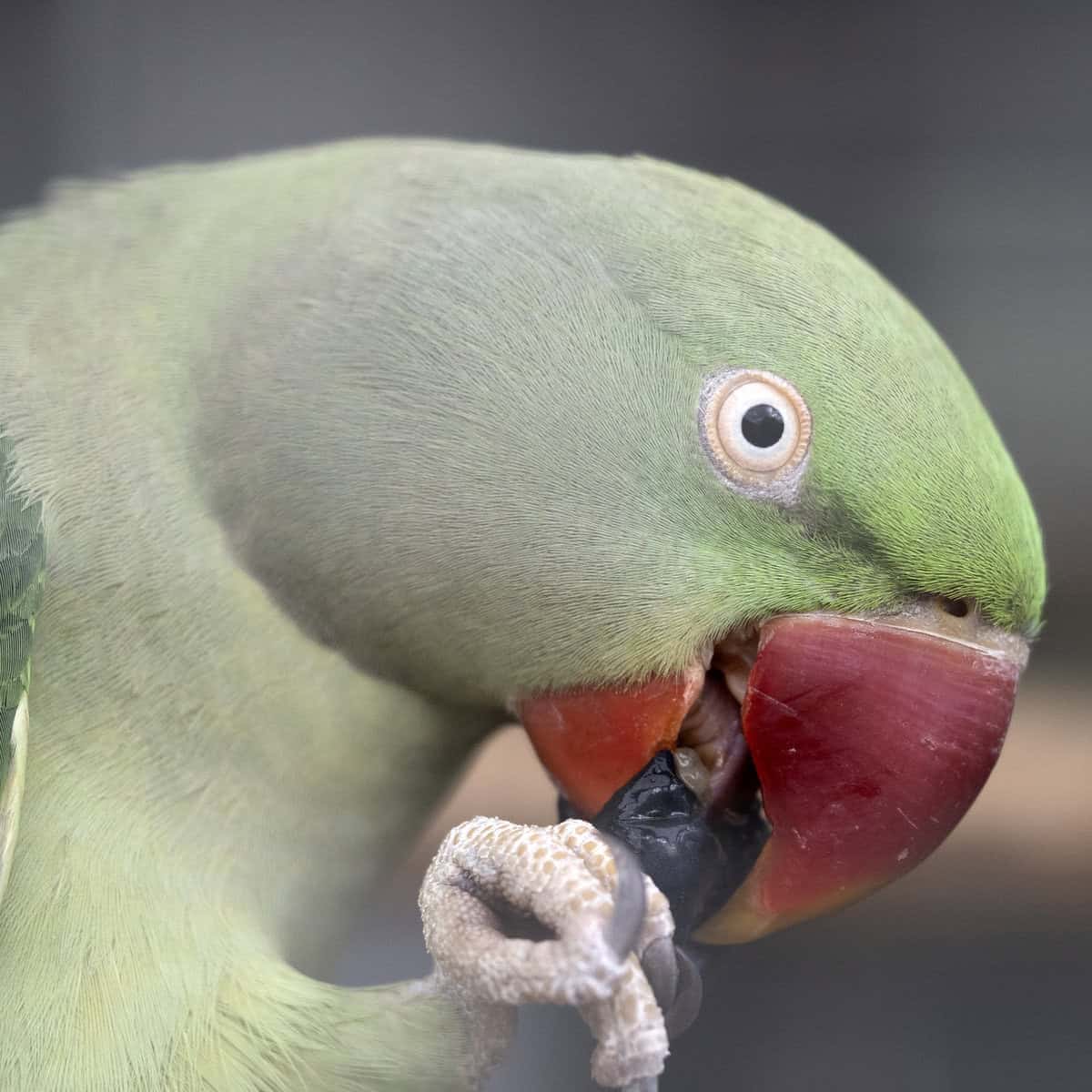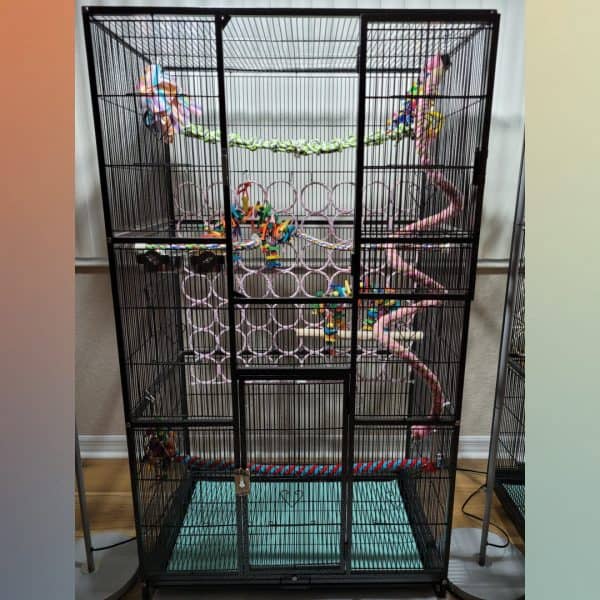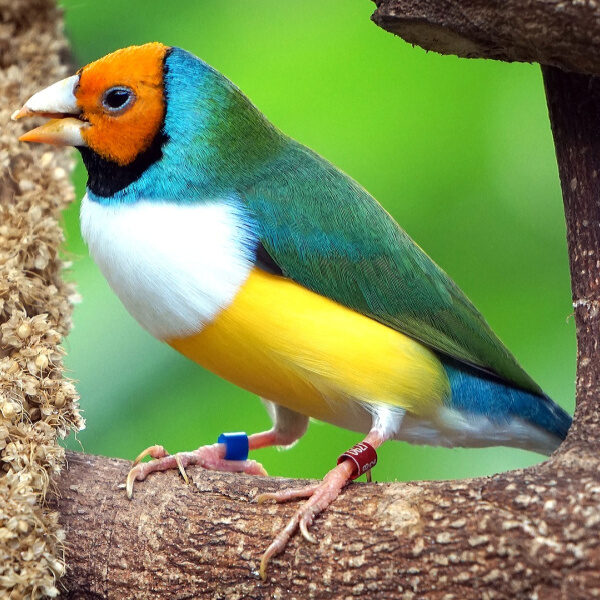Discovering your pet bird engaging in masturbation can be surprising and even concerning for many bird owners.
While it may seem like an unusual behavior, it’s important to understand that masturbation is a natural part of avian sexual expression.
In this article, we’ll explore the ins and outs of bird masturbation, helping you determine whether your feathered friend’s behavior is normal or if intervention is necessary.
Understanding Bird Masturbation
What is Bird Masturbation?
Bird masturbation refers to self-stimulating behaviors that birds engage in for sexual pleasure.
These behaviors can vary widely between species but often involve rubbing or pressing their cloaca (the external opening for their reproductive and excretory systems) against objects in their environment.
Male birds might be observed rubbing their vents on perches, toys, or even human hands, while females may engage in similar behaviors or exhibit body postures indicative of sexual arousal.
Is Masturbation Normal in Birds?
Contrary to what some might think, masturbation is a common and natural behavior observed in many bird species, both in the wild and in captivity. [Research conducted by evolutionary biologist Tom Price] suggests that this behavior is more widespread than previously thought. While the frequency and intensity can vary, occasional masturbation is generally considered a normal part of a bird’s behavioral repertoire.
Causes of Masturbation in Pet Birds
Hormonal Influences
One of the primary drivers of masturbatory behavior in birds is hormonal fluctuations. These can be triggered by:
– Seasonal changes in daylight hours
– Changes in temperature and humidity
– Interactions with other birds or humans
In captive environments, artificial lighting can disrupt natural hormone cycles, potentially leading to more frequent sexual behaviors throughout the year.
Environmental Factors
The environment plays a crucial role in stimulating sexual behavior in birds. Factors that can contribute include:
– The presence of reflective surfaces like mirrors
– Certain toys or perches that birds find stimulating
– Inappropriate handling or petting by owners
Diet can also play a role, with high-protein foods sometimes triggering increased hormonal activity.
Social and Psychological Factors
Birds are social creatures, and in the absence of a mate, they may form strong bonds with their human caregivers or even inanimate objects.
This can lead to displaced sexual behaviors, including masturbation. Additionally, boredom or lack of mental stimulation can result in birds engaging in excessive self-stimulation as a form of entertainment or stress relief.
When Masturbation Becomes a Problem
Signs of Excessive Masturbation
While occasional masturbation is normal, excessive behavior can indicate an underlying issue.
Signs that masturbation has become problematic include:
– Engaging in the behavior multiple times per day
– Neglecting eating or other normal activities
– Becoming aggressive or territorial around preferred masturbation spots
– Developing sores or irritation on the vent area
Health Risks Associated with Excessive Masturbation
Excessive masturbation can lead to several health concerns:
– Physical injury or infection of the cloaca
– Chronic egg-laying in females, which can lead to nutrient depletion
– Behavioral issues such as increased aggression or anxiety
– In severe cases, it may contribute to feather plucking or self-mutilation
Managing Masturbation in Pet Birds
Environmental Modifications
To help manage your bird’s sexual behaviors, consider the following environmental changes:
– Remove mirrors or reflective surfaces from the cage
– Provide a variety of toys that encourage foraging and mental stimulation
– Ensure your bird gets 10-14 hours of uninterrupted darkness each night to regulate hormonal cycles
Behavioral Training Techniques
Consistent training can help redirect your bird’s focus:
– Use positive reinforcement to encourage non-sexual behaviors
– Distract your bird with training sessions or play when masturbation begins
– Avoid petting your bird on the back or under the wings, as this can be sexually stimulating
Diet and Lifestyle Adjustments
Making changes to your bird’s diet and routine can help regulate hormones:
– Limit high-fat and high-protein foods during breeding seasons
– Increase the variety of fresh vegetables in their diet
– Maintain a consistent daily routine to reduce stress
When to Seek Professional Help
Consulting an Avian Veterinarian
If your bird’s masturbation seems excessive or is accompanied by other concerning symptoms, it’s time to consult an avian veterinarian. They can:
– Rule out any underlying health issues
– Provide guidance on hormone therapy if necessary
– Offer species-specific advice on managing sexual behaviors
Working with an Avian Behaviorist
For persistent behavioral issues, an avian behaviorist can:
– Develop a customized behavior modification plan
– Help you understand and respond appropriately to your bird’s body language
– Provide strategies for enriching your bird’s environment to reduce problematic behaviors
Conclusion
Masturbation in birds is a natural behavior that, in moderation, should not cause alarm.
However, it’s essential to monitor the frequency and intensity of these behaviors to ensure they don’t negatively impact your bird’s health or quality of life.
By understanding the causes and implementing appropriate management strategies, you can help your feathered friend maintain a balanced and healthy lifestyle.
Remember, every bird is unique, and what’s normal for one may not be for another. If you’re ever in doubt about your bird’s behavior, don’t hesitate to reach out to a qualified avian professional.
With patience, understanding, and the right approach, you can ensure your pet bird remains happy, healthy, and well-adjusted.




Robert Meuse
11 Aug 2024Hello. Interesting article. I’ve been dealing w/ tiels for way over 15yrs. What’s funny of this is that, especially in males (I’ve had 2 females-1 receiving a male companion not knowing that he was a she so to speak having successful clutches (became a “breeder” for short period of time before giving them (both) to an actual breeder. The 2nd female took to me & became a habitual egg layer in which that she died due to not able to pass an egg & became “stuck” (don’t have to express on how that 1 affected me). The males: 1 loved rubbing himself on my foot while wearing socks. My current 1 must have his way w/ me via perched on my hand 2-3 times per day. Given on how desires in the homo sapiens species, think of what would it be like to “withhold” such needs? Same goes (IMO) in regards towards the avian community. Its a need that shouldn’t be suppressed. I feel that its a natural relief, maybe an enjoyment and/or some sort of “love” expression. Who Knows……..